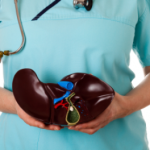Artichoke Tea – Treatment for Gall, Liver and Heart
Artichoke is an efficient medicinal vegetable and it’s incredibly rich in antioxidants. It contains numerous vitamins, minerals, proteins and healthy carbohydrates. For therapeutic purposes, you must use only the leaves. They contain cynarin that has an essential role in treating the liver and gall disorders.

Artichoke Tea – Benefits
Artichoke tea is bitter, but the benefits it has for the health should make us overcome this aspect. In fact, the bitter substances in the plants and fruits are those that can successfully treat all the liver, bile and gall problems.
- – It prevents fatigue and mental exhaustion
- – Makes the face glowing and healthy
- – Boosts the immune system
- – Prevents birth defects in children
- – Treats kidney, gall and liver infections
- – Cures hemorrhoids
- – Regenerates the liver cells
- – Eases the rheumatism and gout pains
- – Reduces and balances the blood sugar levels – those who suffer from diabetes can consume unsweetened artichoke tea
- – Combats the Salmonella, Staphylococcus and Proteus infections
- – Facilitates the digestive juices secretion
- – Combats different types of cancer
- – Boosts muscles and revigorates the organism
- – It’s beneficial for nausea, vomiting, diarrhea, constipation, bloating, heartburn, enteritis, colitis and intestinal fermentation
Artichoke Tea for Liver and Gall
The cynarin and polyphenols from the artichoke will stimulate the biliary secretion of the liver, favoring the elimination of toxins and bad cholesterol. The artichoke tea consumed regularly will also stimulate the gallbladder contraction and the evacuation of the bile in the intestine. Moreover, this miraculous plant will activate the anti-toxic function of the liver and will nourish the liver cell. Internally, the artichoke tea can be administered to treat the following diseases:
– Chronic hepatitis, cirrhosis, liver failure, liver allergies and alcoholism
– Kidney failure, biliary dyskinesia, angiocolitis, acute and chronic cholecystitis, intestinal infections, intestinal fermentation, chronic and acute nephritis
Artichoke Tea for Weight Loss
It is known that artichoke is beneficial for weight loss and combating obesity. It has an extraordinary diuretic effect, reduces the cravings for sweet treats, makes you feel full, burns fats and helps eliminate the urea and the toxins from the liver and the kidneys. Your skin will benefit from the massive elimination of the waste products, diminishing hives. Moreover, artichoke tea combats water retention.
Artichoke Tea for the Heart
The beneficial effect that the artichoke tea has for the heart is less known. This beverage is a great vasodilator, reduces high blood pressure and cholesterol and protects the heart. By consuming artichoke tea on a regular basis, you can prevent the cardio-vascular disorders, especially the development of plaques and atherosclerosis or angina pectoris.
How to Prepare Artichoke Tea
You must prepare an infusion from 2 teaspoons of crushed artichoke leaves and 300 ml of boiling water. After 10 days, you must increase the dose to 4 teaspoons and after another 10 days, you must get to 5 teaspoons of artichoke leaves added to 300 ml of water.
How to Drink Artichoke Tea
Drink this tea moderately. Take 2 – 3 sips in the morning, on an empty stomach and after that lay in the bed on your right side for about 20 – 30 minutes. Drink the rest of the tea slowly, sip by sip, during the same day, 30 minutes before mealtime. The artichoke tea diet must be followed for about 30 days, with a 30-day break and after that you must use it again.
Contraindications
The artichoke tea is not recommended for those who suffer from gallstones, biliary obstruction or for those who are allergic to artichoke. Don’t drink it during pregnancy or nursing. When consumed excessivily, the artichoke tea can cause nausea, diarrhea or hepato-biliary colic.
These details must only be used for information purposes, they do not replace the doctor recommendation. Don’t use this information for self-diagnosis or self-treatment.



